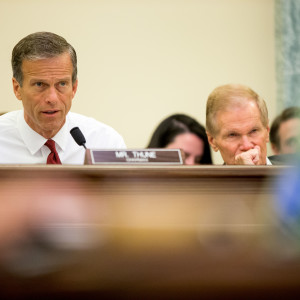Congress came one step closer to exempting small broadband providers from the Federal Communications Commission’s net neutrality rules Wednesday, one day after a federal appeals court struck down providers’ attempt to declare them illegal.
The Senate Commerce, Science and Transportation Committee approved the Small Business Broadband Deployment Act during markup Wednesday. The legislation exempts small and rural broadband providers with 250,000 or fewer subscribers from the burden of proving they’re complying with the FCC’s net neutrality regulations passed last year.
Providers meeting the bill’s definition won’t have to disclose information including monthly data charges, promotional rates, data caps and network performance.
During markup, Commerce Committee Chairman John Thune said the bill “takes one component of the difficult and sometimes toxic debate over internet regulations, and tries to strike an honest and reasonable compromise that both protects Internet end users and relieves regulatory burdens that disproportionately affect small Internet providers.”
The House of Representatives passed similar legislation by a unanimous 411 to zero vote in March, sending a strong bipartisan mandate to pass the exemption in the Senate.
FCC commissioners exempted small providers from the requirements for one year after passing the Open Internet Order in 2015, and voted in December to extend the exemption for another year for providers with 100,000 or fewer subscribers.
The House bill, authored by Communications and Technology Subcommittee Chairman Greg Walden, extends the exemption for five years. The Senate version advanced Wednesday included an amendment by Democrats limiting the exemption to three years.
“While I respect the goals of this legislation, the bill, if passed, would mean that approximately three million more consumers – for a total of nine million consumers – will lose access to important information about how their broadband provider operates its network,” Ranking Democrat Sen. Bill Nelson said. “All consumers, irrespective of the size of their broadband providers, deserve information about the fees associated with their service, along with how their monthly broadband usage can affect their rates.”
Nelson added the ruling Tuesday by the U.S. Court of Appeals for the D.C. Circuit, which struck down the broadband industry’s challenge to the rules’ legality, affirms their need.
“I am pleased that the court upheld these important open internet protections,” Nelson said. “It is a significant milestone for consumer protections on the internet and a strong affirmation by the court of the FCC’s authority under the Communications Act.”
Republican Sens. Steve Daines of Montana, Jim Risch of Idaho and Democrat Joe Manchin of West Virginia authored the Senate bill.
“The administration does not oppose this exemption, the Small Business Administration supports this exemption, and most importantly, the small businesses that we represent support this exemption,” Daines continued, “so they can focus on their businesses and their customers rather than burdensome regulatory requirements.”
Before passage of the House bill, the White House indicated President Obama would sign the exemption.
Democrat Sens. Ed Markey of Massachusetts and Richard Blumenthal of Connecticut — the two lawmakers behind research that led to the divisive set-top box proposal pending at the FCC — opposed advancing the bill.
Several small and rural providers testified to the FCC and Congress last year they would be forced to forego plans to expand their networks if forced to comply with the transparency requirements, which they said would mandate they funnel resources away from innovation and deployment toward legal expenses.

